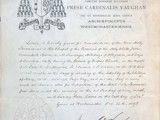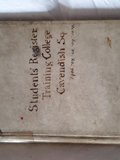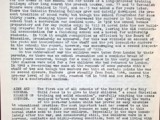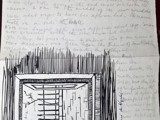London Papers
1893 - 1965
Within the SHCJ EP archives, this collection begins with annals written in convents and schools established prior to the purchase of Cavendish Square, but the largest collection of material relates to the period from 1890 to 1970 when the SHCJ's school and teaching training college were located there. Here you can view documents from the first few years of the SHCJ's time at Cavendish Square, such as an 1893 Permission issued by the Archbishop of Westminster, to documents describing the impact of the second world war and reminiscences of an SHCJ looking back on her time in London made during the 1960s.

Permission for Blessed Sacrament
1893
This document signed by Cardinal Vaughan, Archbishop of Westminster, gives permission for the Benediction of the Holy Sacrament in the chapel of Cavendish Square. From it we learn saints' feasts and events that were important to the Society and the school, including the feasts St Patrick, St Aloysius, St Edward and St Teresa, the two latter feasts relating to foundation of the SHCJ. It also lists key school events such as the meetings of the Sodality of the Children of Mary and prize giving days.

Cavendish Square Training College Register
1906 - 1911
This early register of the SHCJ's teacher training college at Cavendish Square tells us about both the nuns and lay women who were trained at the college by giving details such as their date of entry and previous education. It is a potentially helpful document for family historians and tells us the numbers of student teachers trained by the Society during the 1900s.

Brief History and Aims and Methods of SHCJ at Cavendish Square School
1949
This interesting document not only gives an account of the development of Cavendish Square School from 1853 - when it was located in Queen's Square - to the late 1940s, but also states the 'aims and methods' of SHCJ education in a post-war world. The rest of the paper defines how the SHCJ would currently apply their long held maxim to 'meet the wants of the age' by considering needs of London’s children who were traumatised by war and surrounded by profound changes in society. The sister who wrote this document - possibly prepared for a newsletter or a meeting of school governors and parents - defines what the SHCJ saw as their 'most important task [...] the education of happy stable persons because so many obstacles to this normal state seem to face our children.'

Memoir of Mother Wilfrid (Catherine) Mulgrew regarding Cavendish Square from 1897 to 1920
c1965
This is a page from an account of Cavendish Square School by Sr Wilfrid (baptised Catherine) Mulgrew. After a time in Preston just after her first profession as an SHCJ sister in 1896, Cavendish Square was the second school where Sr Wilfrid taught. In her memoir she recalls the original layout of the school with its dark yet 'dignified and serene' interiors. She also remembers the people living in the convent and working in the school: sisters such as the 'formidable' superior Mother Aloysia Ryan, lay staff such as music teacher Mrs Hewson whose 'peculiar methods' were a 'remarkable success' and the cook Martha Delenos who was in awe of the children's 'tremendous' appetites. Sr Wilfrid pays tribute to the industrious pupil teachers who – prior to the pupil-teacher training system being phased out in the 1910s - worked all day as class mistresses at Cavendish Square and in the evening were taught themselves as pupils by the nuns: ‘rather a hard position’. Sr Wilfrid praises them as 'wonderful girls putting up with all kinds of difficulties so cheerfully'.
Cartoon of evacuated Training College at Layton Hill
1943 - 1944
This hand drawn cartoon describes a year spent at Layton Hill by the student nuns taught at Cavendish Square Teacher Training College from 1943 to the end of 1944. Along with the London SHCJ Community, the boarding school and primary school, the lecturers and students were evacuated from Cavendish Square after the central square suffered a direct hit: the situation in London had become too dangerous. With sketches and narrative limericks, this booklet presents gently humorous caricatures of the principal and vice principal as well as the author’s fellow students. The College sisters had clearly developed a spirit of camaraderie throughout the upheaval of their move to Blackpool and, moreover, during a dark time for Europe.







































